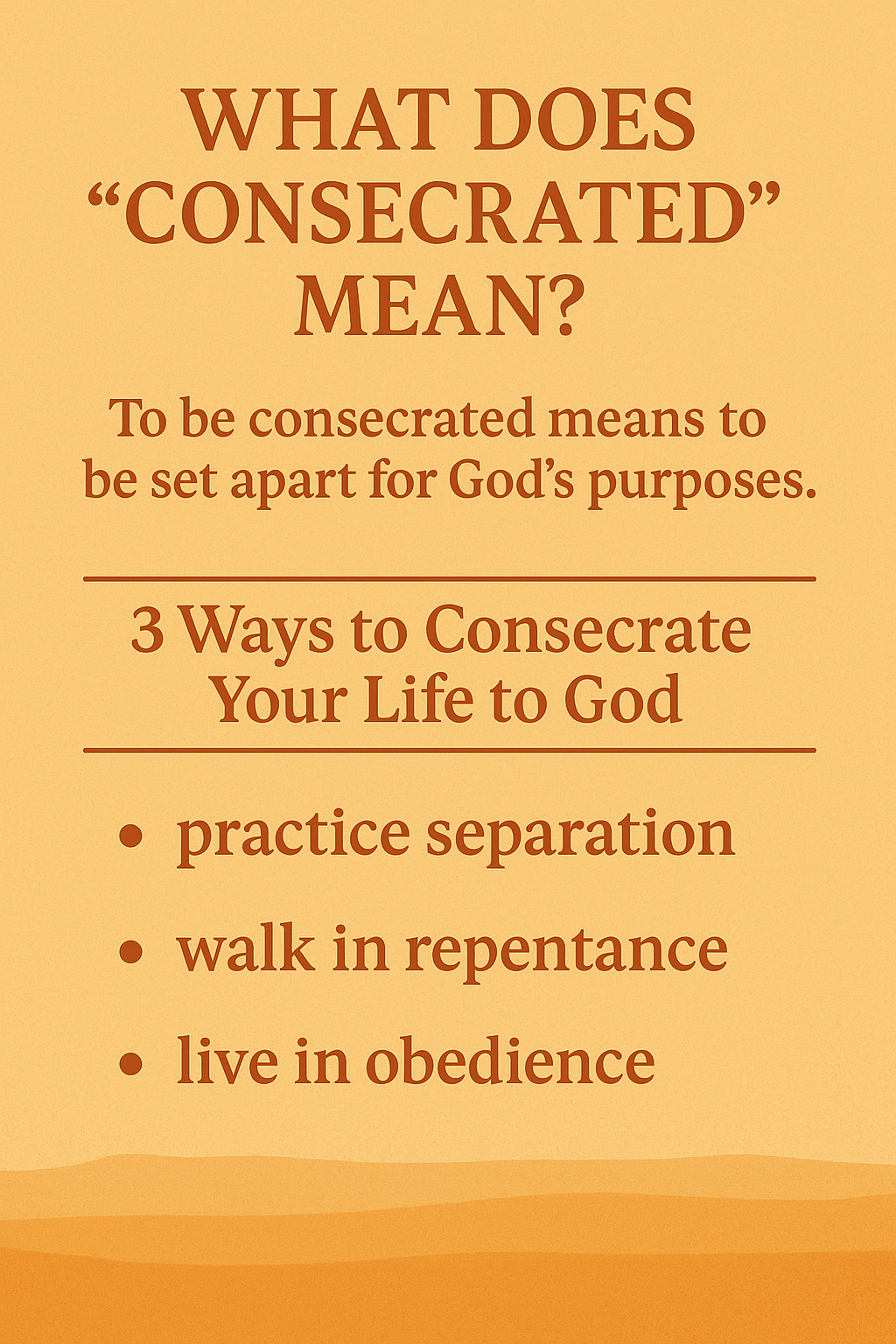To be consecrated means to be set apart for God’s purposes. In the Bible, consecration involves dedicating your life fully to the Lord through obedience, worship, and holiness, allowing Him to direct every area of your life.
A few months ago, I went on a men’s retreat, which was my first retreat in a long time. Let me tell you, it was like taking a deep breath after being underwater for too long. Being away didn’t stop life, but for a moment, I could step away from the noise and just spend time with God and a group of men hungry for the same thing. It was refreshing in the deepest sense of the word. The pace slowed down; we were present, and in that space we could hear God speak freshly.
I needed that time apart to realign my heart. It reminded me of who I’m called to be, and more importantly, who I represent when I step back into the chaos of everyday life. I share that story because it paints a picture of what consecrated means in the Bible. This is not just about being a Christian; it’s about being set apart on purpose, for a purpose.
So, if you’re reading this right now, I want to challenge you to block out the distractions, open your heart, and lean in. If you can grasp what consecrated means in the Bible and you practice it, this will shift the entire trajectory of your walk with Jesus.
What Does Consecrated Mean in the Bible?
When the Bible talks about being consecrated, it means being set apart and prepared for God’s purpose. However, it is not just the words you say but the life you live to accompany it. This does not happen by accident. It is intentional. Anyone in the Bible who was consecrated positioned their heart, mind, and life in such a way that God could use them more effectively. The best part is that God used everyone who consecrated themselves to him.
Old Testament Instances of Consecration
"So I will consecrate the tent of meeting and the altar and will consecrate Aaron and his sons to serve me as priests. Then I will dwell among the Israelites and be their God." (Ex. 29:44-45)
In the Old Testament, consecration was an intense process. Exodus 29 outlines everything that had to be done to consecrate Aaron and his sons to be prepared to serve as priests unto the Lord. This speaks to the heart of what consecration is. A time of preparation that prepares you to serve in some fashion. In the Old Testament, the consecration for Aaron and his sons took seven days. The purpose in doing this was to establish the people and the place where God would meet with the Israelites. God was taking a place and making it sacred and holy so his presence could dwell with them.
The process itself involved the sacrifice of animals, the shedding of blood, the baking of bread, the dressing of Aaron and his sons in priestly garments, and a sacrifice burned on the altar. What is important to note is that most of the actions taken in the process were outward and, in many ways, symbolic. This does not mean their hearts were not engaged, but being consecrated ceremonially, the focus was primarily outward.
New Testament Perspectives on Consecration
"For them I sanctify myself, that they too may be truly sanctified." (Jn. 17:19)
The New Testament uses sanctify or sanctified, sometimes in place of consecrate, but the meaning is the same, which is being set apart for God’s holy use. Even though the purpose of consecration doesn’t change, the focus does. While the Old Testament had many outward signs and rituals for consecration, the New Testament zeroes in on the heart. This is what God was after all along anyway. Not just changing what you do but changing who you are.
God is not just looking for a clean outer appearance, but a surrendered heart. Those are the hearts he transforms into people who reflect his character. So New Testament consecration works inward, then flows outward. You consecrate your heart and everything else follows.
The Process and Purpose of Consecration
Ultimately, the purpose of consecration or sanctification is to position yourself for God to use you more effectively. A consecrated person has laid aside the influences of the world to go after the things of God. This is not just reserved for pastors or people in ministry, but for everyone. If you want to represent Christ well on the earth, then consecrate your life to him so that in every arena you walk into, you can influence it with the presence of Jesus. This is the heart of consecration. Setting apart your life so you can be more effective for the kingdom.
Consecration involves laying down your will, your desires, and even turning away from sin so that you become a holy vessel through which God can flow. This positions you to be more effective in serving the body of Christ and being a witness to the world.
How Do You Consecrate Your Life Today?
As with many things, there is a theoretical idea and there is a practical reality. If you want to incorporate consecration into your life, here are three practical suggestions.
1. Practice Separation
One reason to consecrate is to not only make yourself available, but to hear from God more effectively. In the noise-filled environments we often place ourselves in, it is easy for God’s voice to get lost. Everywhere we turn, there is potential for distraction (noise), which hinders our ability to hear from God. These distractions can also shape the direction of our heart as they influence our emotions, our thinking, and even our choices. To consecrate means setting aside time (intentionally) to separate from these things. If you don’t, then it becomes extremely difficult to commit yourself fully to God because you cannot fully focus on him.
2. Walk in Repentance
Any person who is going to consecrate will end up in a state of repentance. You cannot avoid it. This does not mean you are living some extremely sinful lifestyle. It means as you draw closer to God, aligning your character with his, he reveals the things in you that are not like him. He does this because he wants to change you to make you more effective. Consecration will reveal how short you fall, and in that posture, it leads to repentance.
3. Live in Obedience
There can be no consecration without obedience. In fact, if there is no commitment to obey, then there is no need for consecration. You can’t have one without the other. This could be the hardest part of consecration, because you are committing to whatever God tells you to do. However, if you want consecration, then obedience must follow.

Scriptures and Prayer for Personal Consecration
Here are several Scripture passages that speak to being consecrated. "Therefore, I urge you, brothers and sisters, in view of God’s mercy, to offer your bodies as a living sacrifice, holy and pleasing to God—this is your true and proper worship." (Rom. 12:1)
"Those who cleanse themselves from the latter will be instruments for special purposes, made holy, useful to the Master and prepared to do any good work." (2 Tim. 2:21)
"Consecrate yourselves and be holy, because I am the Lord your God. Keep my decrees and follow them. I am the Lord, who makes you holy." (Lev. 20:7-8)
Lord,
Today, I step away from the noise to draw closer to you. As I sit before you, search my heart and show me anything that is unlike you and hinders your ability to use me. Give me strength to lay those things down so I can pursue your purpose for me. Fill me with courage so I can obey you and the humility to repent when you reveal things that don’t reflect you. I consecrate my heart and life to you so that my life will honor you and bring glory to your name.
I pray all these things in the name of Jesus.
Amen.
Conclusion: Living a Consecrated Life
As you consider consecration for your life, please recognize this is not a onetime moment. This is an ongoing process because the world is still there and your flesh will still try to fight against the things of God. That’s why consecration needs to be part of your life continually; a daily surrender to what God wants so he can set you apart for his good use. These are the ones God uses the most.
Photo credit: ©Getty Images/Oleh_Slobodeniuk

He is the author of The Pursuit of Purpose, which helps readers understand how God leads them into his will, and the author of The Pursuit of Victory: How To Conquer Your Greatest Challenges and Win In Your Christian Life. Clarence is also committed to helping 10,000 people learn how to study the Bible and has released his first course, Bible Study Basics, to achieve that goal. To learn more about his ministry and resources, please visit clarencehaynes.com.




.jpg)